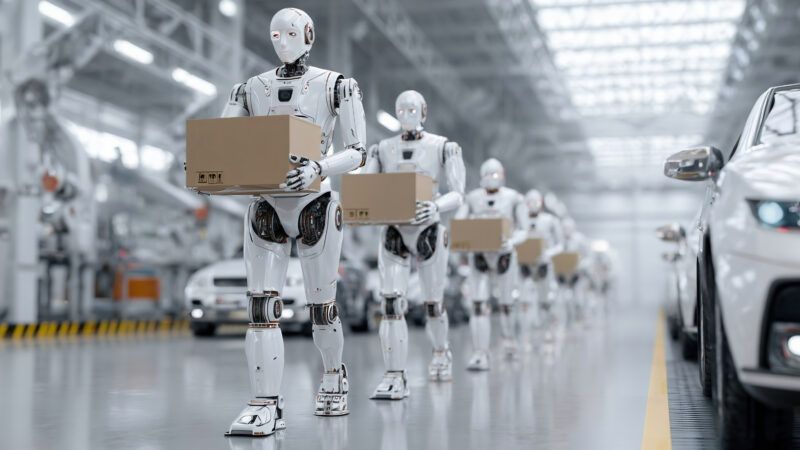Democrats Are Proposing a 'Robot Tax' To Save Jobs From AI. Here's Why It Won't Work.
The policy would slow innovation, reduce competitiveness, and leave American workers unprepared for the future.

There's a reason you've never heard of a Model T tax. No one proposed a levy on the cotton gin or a fine for using computers. America's prosperity came from embracing innovation, not taxing it. Now some politicians want to reverse that formula by putting a price on progress itself.
Senate Democrats have published a new report called "The Big Tech Oligarchs' War Against Workers: AI and Automation Could Destroy Nearly 100 Million U.S Jobs in a Decade." It presents a dire forecast of significant job displacement due to artificial intelligence (AI) and proposes an extreme response—the imposition of a "robot tax" to fine companies that integrate AI to "expand automation." According to the report, the government would use the revenue from this tax "to benefit workers harmed by AI."
In the short term, that might sound appealing. A company may retain a vulnerable worker on staff rather than pay the tax. But over time, it would discourage both employers and employees from adapting to new technology. Workers shielded from automation would have less incentive to learn new skills or stay current with AI tools, while employers would fall behind competitors willing to innovate.
Meanwhile, AI progress will not slow. It will become more savvy, more sophisticated, and more reliable. It's inevitable that the use of AI will become the economically smart move, with or without a robot tax.
Overseas competitors won't slow their adoption of AI. They'll use it to boost efficiency, improve quality, and lower prices—and consumers will notice. Firms facing a robot tax, meanwhile, will struggle to keep up. They may end up cutting jobs not because of automation, but because they're losing ground to international rivals offering better, cheaper products. History shows that technological progress drives productivity and expands markets, creating more jobs in the long run. A robot tax would shut the door on that outcome.
Workers supposedly protected by a robot tax would actually fall behind. When looking for a new job, they will have glaring gaps in their resumes—no experience using AI tools, no coursework on AI fundamentals—while applicants from tech-forward economies will have those skills and be hired instead.
In the long run, a robot tax would hobble American innovation. If firms are discouraged from adopting AI, the market for new AI products will shrink, driving innovators and startups to friendlier markets abroad. The ripple effects would be devastating: fewer clients for AI developers, less venture capital, and a brain drain of talent and ideas.
Innovation breakthroughs rarely emerge fully formed from large, established corporations. They emerge from scrappy startups building tools for larger clients. By making established companies hesitant to purchase and integrate new AI, a robot tax effectively eliminates the primary market for these AI-focused startups. But if established companies are fined for using AI, those startups lose their customers before they even exist. The result is a chilled innovation climate, fewer world-leading companies, and none of the entirely new job categories they would have created.
This chilling effect wouldn't stop at the job market—it would ripple into our schools and universities. Educational systems follow economic incentives. If businesses no longer seek employees with AI skills because they are shielded from technological change, universities and trade schools will stop training students in these areas. Curricula will stagnate, and we'll be preparing students for the economy of yesterday instead of tomorrow. The result: a workforce less competitive and a nation less prepared for the technologies shaping the world.
A robot tax is a policy of retreat dressed up as protection. It is a shortsighted attempt to freeze a moment in time rather than help Americans adapt to change, ignoring the dynamic and global nature of technological progress. While born from a genuine concern for workers, it would achieve the opposite—leaving the U.S. less skilled, less competitive, and less innovative.
America's strength has always come from embracing progress, not fearing it. We don't need a tax on the future. We need the courage—and the imagination—to meet it head on.


Show Comments (55)